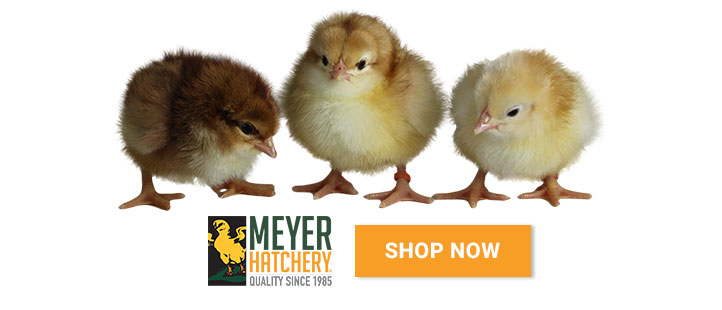
Whether you’re buying a present for an animal loving child or for your own little pet, we’ve got the perfect gifts, big and small. Check out these top tips, now at an amazing price in the Omlet Black Friday Sale!
Shelters and Play Tunnels
Give your rabbits or guinea pigs something fun to play with on their run this winter with Zippi Shelters and Play Tunnels. Available in green or purple, the shelters are a great way of providing a safe and secluded place for your pets to hide, or as a platform they can jump onto and watch the world go by.
The play tunnels can be placed independently anywhere on the run for your pets to chase each other through, or be connected to the shelters to create a maze that mimics their wild burrows. Entertainment and safe spot all in one!

Caddi
The Caddi Treat Holder is the perfect stocking stuffer for chickens, rabbits or guinea pigs, or their owners. The Caddi can be filled with a range of pet appropriate treats, and will swing as the animals peck or bite the treats. It’s the ideal both mental and physical challenge, with the added bonus of a tasty reward!
Hung from the roof of your hutch and run, the height of the Caddi can easily be adjusted, and it’s super easy to remove it for refilling and cleaning.
Qute Hamster and Gerbil Cage
The Qute allows hamster and gerbil owners to get closer to their pets. The modern design means you will be happy to display the piece in your kitchen or living room, and the large, crystal clear bedding tray makes it easy for pet owners of all ages to see what their pets are up to. The bedding tray also offers a convenient way of getting your hamster or gerbils out of the cage for playing, socializing and exercise.

Geo Bird Cage
Upgrade your parakeet/budgie or other small birds’ home this winter with the stunning Geo Bird Cage. The Geo has got everything your bird needs to become a natural part of the home, and you can accessorize with baths, mirrors and toys for your pets to enjoy.
Eglu Go Hutch
Do your current pets need a home improvement? The Eglu Go Hutch is the perfect way of keeping rabbits or guinea pigs in the garden. The handy integrated hutch and run solution allows your pets to run in and out as and when they like during the day, and when it’s time for a nap they can curl up in the safe and insulated house. In winter you can move the hutch closer to the house, making cleaning and spending time with your pets even easier.
This entry was posted in Birds
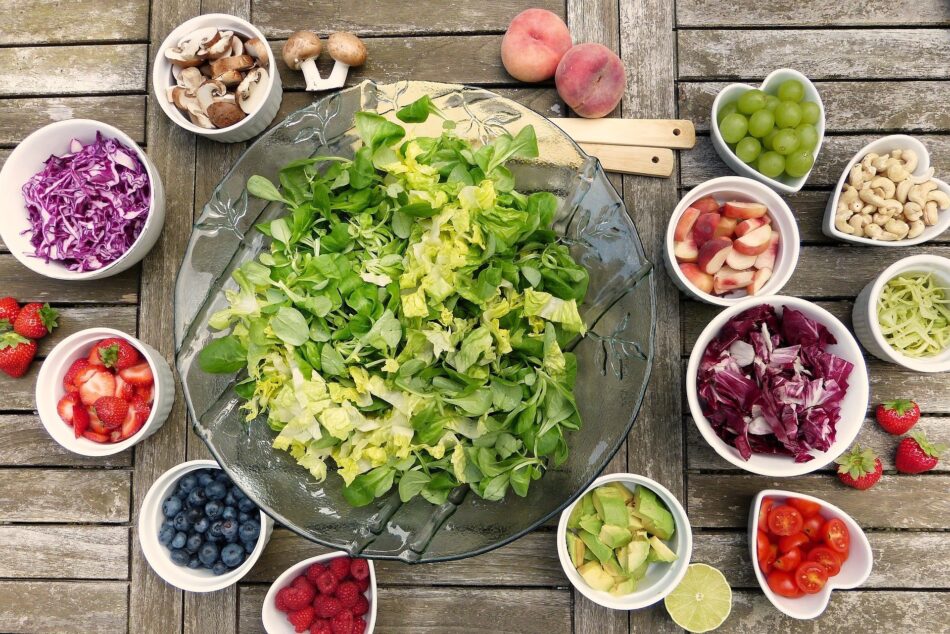
Some animals, such as rabbits and guinea pigs, are herbivores. Others, like hamsters, are omnivorous. Finally, there are also carnivores like cats that cannot survive without meat.
All animals need to have their nutritional needs satisfied. However, this does not mean you can’t have a vegan dog. Vegan cats, though, are a lot trickier.
Can my dog have a vegan diet?
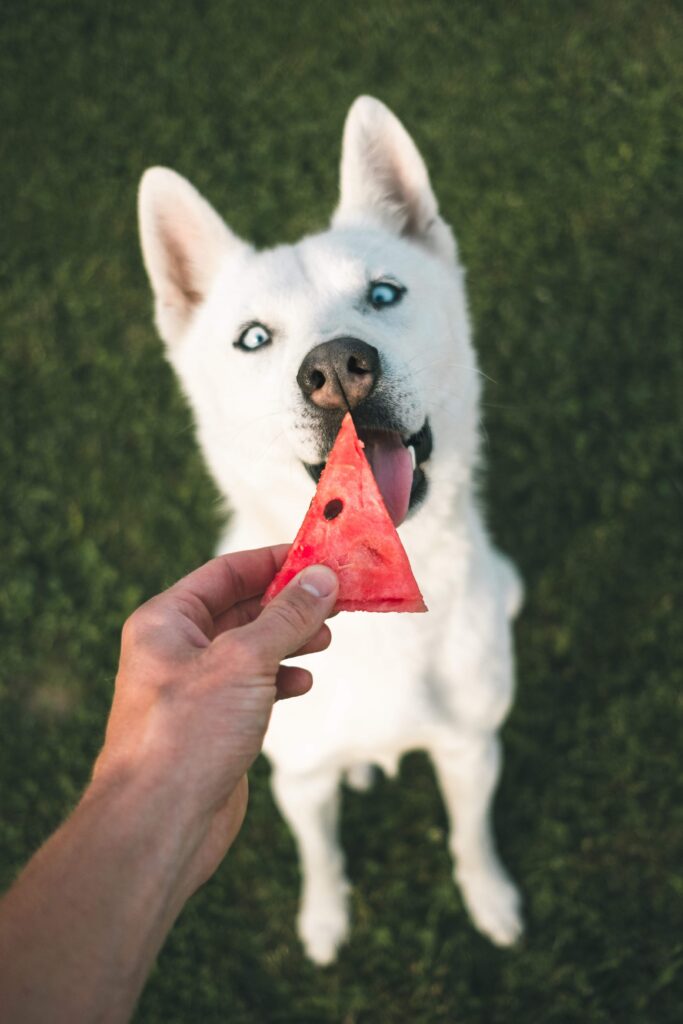 If you were to meet a species of animal for the first time and had to make an accurate guess about its diet, you would get lots of clues by looking at its teeth. The teeth of a dog, like the teeth of a bear, proclaim loud and clear that this animal is an omnivore – that is, one that eats both meat and vegetables. If you think of your dog as a domesticated wolf, you get a good idea of its natural diet.
If you were to meet a species of animal for the first time and had to make an accurate guess about its diet, you would get lots of clues by looking at its teeth. The teeth of a dog, like the teeth of a bear, proclaim loud and clear that this animal is an omnivore – that is, one that eats both meat and vegetables. If you think of your dog as a domesticated wolf, you get a good idea of its natural diet.
However, as the panda proves, a supposed meat-eater can sometimes get by perfectly well on a vegan diet. A panda’s teeth are similar to any other bear’s – long canines for meat-eating and molars for grinding vegetation. And yet pandas don’t eat anything other than bamboo. So, if a bear can be vegan, does that mean you can have a vegan dog?
The answer is yes – but it’s a yes with lots of small print! A dog requires a diet that contains the fats and proteins it would get from meat. It is dangerous to ignore this basic need and simply feed your pet with whatever you please. Some dogs have delicate stomachs. Also, a low-fat/high-fibre diet can cause potentially life-threatening problems. A diet that excludes meat should never be fed to a dog without the advice of a professional pet dietician.
The collagen, elastin and keratin found in meat diets are not easily replaced by veggie equivalents. Your dog will also need the ‘long chain’ omega-3 fats found in animal products such as egg, fish and some meats. Vegan omega-3 fats are not the same as animal-derived ones.
All of which presents a headache for the vegan dog owner. There are, however, products available that claim to let your dog live a healthy, meat-free life. Before you take the plunge, it is essential to seek professional, scientific advice and guidance. Compromise is usually the best choice here – a vegan diet supplemented by some of the animal-derived essentials. Crickets, for example, can provide lots of the amino acids and keratin a vegan diet lacks, and they’re 65% protein.
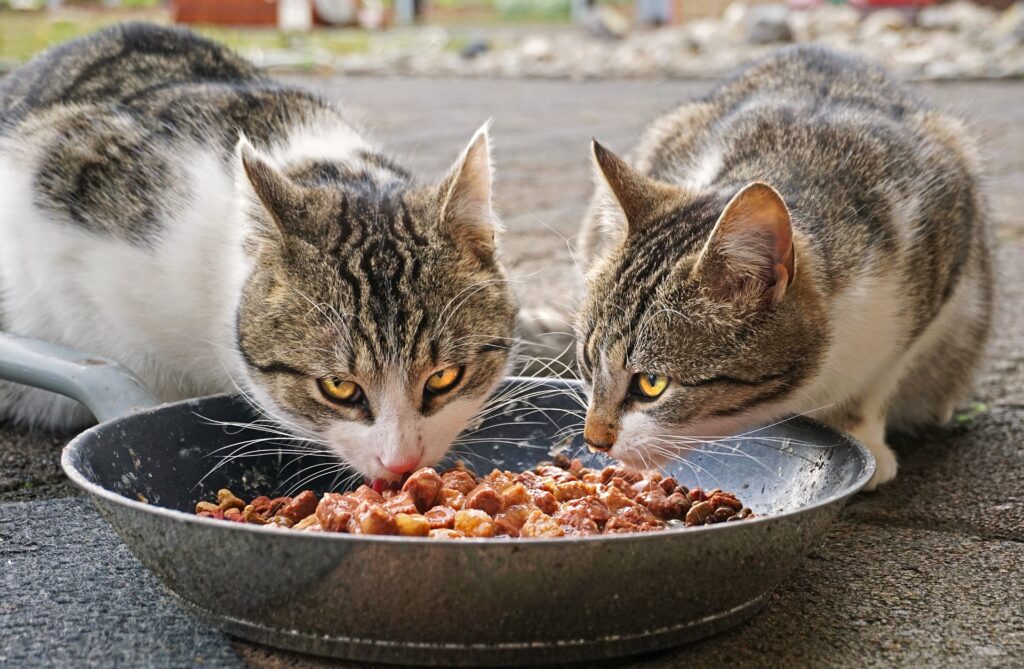
Can my cat have a vegan diet?
The compromise approach is even more important for cats. These are amongst the planet’s true carnivores, obtaining all their dietary requirements from other animals.
The main challenge with minimizing the meat in a cat’s diet is that, unlike many mammals (including dogs), cats cannot produce certain proteins. They have to absorb these from the meat and fish in their diet. Amino acids are another issue – cats deficient in the animal-derived amino acid taurine, for example, usually succumb to a specific type of heart problem.
Even a fortified vegan cat food cannot be confidently recommended. Turn the situation on its head, and try to imagine weaning a rabbit onto a meat-only diet, and you will get some idea of the challenge – and the ethics – involved.
There are some lab-grown ‘meat’ products in development, with vegan and vegetarian cat owners in mind. However, whether these will arrive – and remain – on the market any time soon is hard to guess.
For many vegan pet owners, there is a huge ethical issue involved in feeding the animals they share a space with. Ethics, however, include the animal’s needs too, and it’s an almost impossible issue to resolve when it comes to cats. If you are able to reduce but not eliminate the meat in your cat’s diet, that’s the safer option.
Top 10 pets for vegan households
There are, of course, plenty of other pets that don’t eat meat, or that eat some meat but can still thrive on a meat-free diet. Here are our ten favorites.
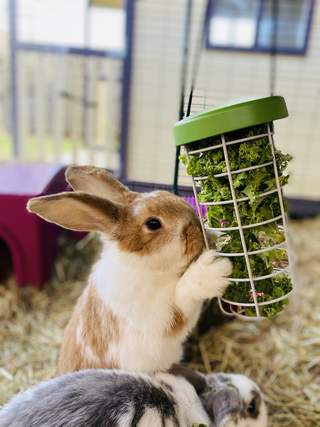 1. Rabbits. No problems here – rabbits are happy vegans, with diets based on hay and vegetables. You could argue that the soft pellets they eject and then eat are animal products of a sort, but they are simply semi-digested vegetation.
1. Rabbits. No problems here – rabbits are happy vegans, with diets based on hay and vegetables. You could argue that the soft pellets they eject and then eat are animal products of a sort, but they are simply semi-digested vegetation.
2. Guinea pigs. Like rabbits, these wonderful little characters thrive on a 100% vegan diet.
3. Hamsters. Most hamster owners give them store food, you don’t always know what’s in it. However, hamsters, like rats and mice, can do without meat.
4. Gerbils. Like hamsters, gerbils are omnivorous. They have sensitive stomachs and need a quality pellet mixture. Too much fresh produce can harm their digestive system.
5. Mice. Although they will eat pretty much anything in the wild, mice can thrive on vegan diets; but it is still best to use a food mix prepared specifically for them. This ensures that they will not be deficient in any of the vitamins and minerals they need.
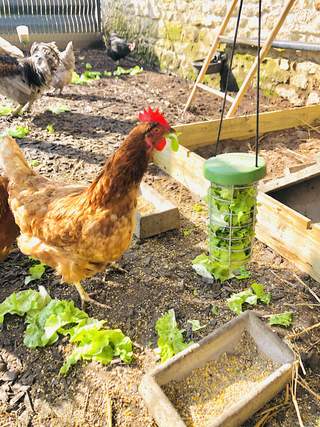
6. Rats. These are the most omnivorous of rodents, but as long as you feed them a vegan mix that has been fortified with all the nutrients they need, they will thrive. Be careful, rats who eat too much animal fat tend to become fat and die prematurely.
7. Chickens. If you watch a free-range hen, it soon becomes clear that she will eat anything – grass, beetles, worms, and everything in your vegetable patch if you’re not careful! Most chicken feed emulates this mix of plant and animal products. However, it is possible to buy vegan chicken feed, and circumstantial evidence suggests that hens can thrive on it. However, they are likely to produce fewer eggs, and you will not be able to stop them scratching for worms and bugs, no matter how vegan the layers pellets are!
8. Parakeets and parrots. Vegans will have no obstacles to face with budgies and parrots, unless the birds are being bred. Egg-brooding female birds need a protein boost, normally delivered via an egg-based food or cooked meat. Vegan alternatives are available, though.
9. Finches. Many finch species enjoy bugs and mealworms as treats, but these are not an essential part of an adult finch’s diet. These birds thrive on a mixture of seeds and fresh vegetables.
10. One for reptile fans. When you think of pet snakes and lizards, you probably have an image of dead mice or doomed crickets. However, there are a few commonly kept pet reptiles that eat a 100% vegan diet, the most popular being the Green iguana. Getting the balance of vegetables just right is very important for the animal’s health, but meat is certainly something you won’t have to worry about.
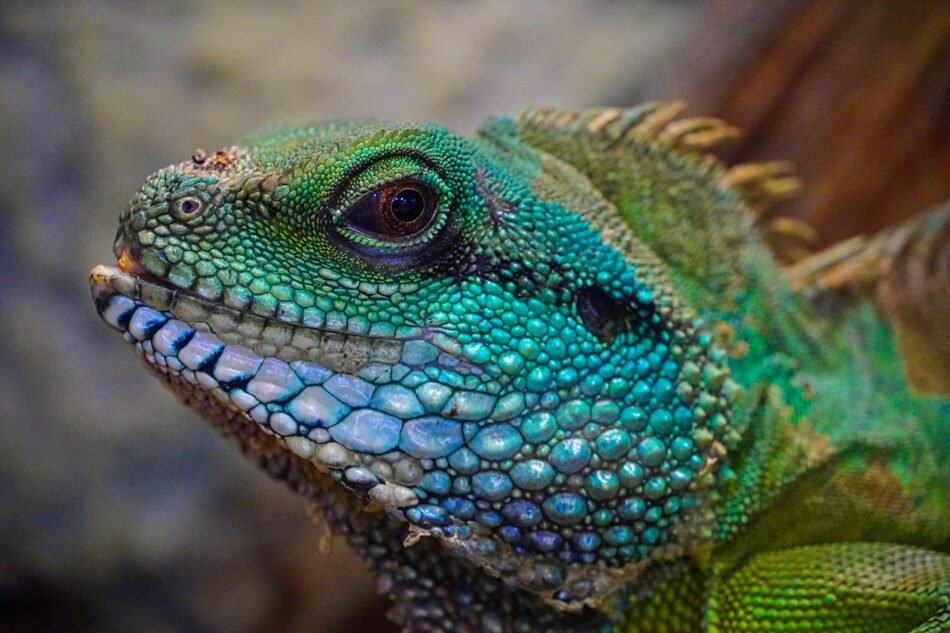
There is no shortage of choice when it comes to vegan pets. Keeping a vegan cat or dog is a much trickier proposition, though. And with all these animals, a balanced diet that matches the pet’s nutritional requirements should be your primary goal.
This entry was posted in Birds
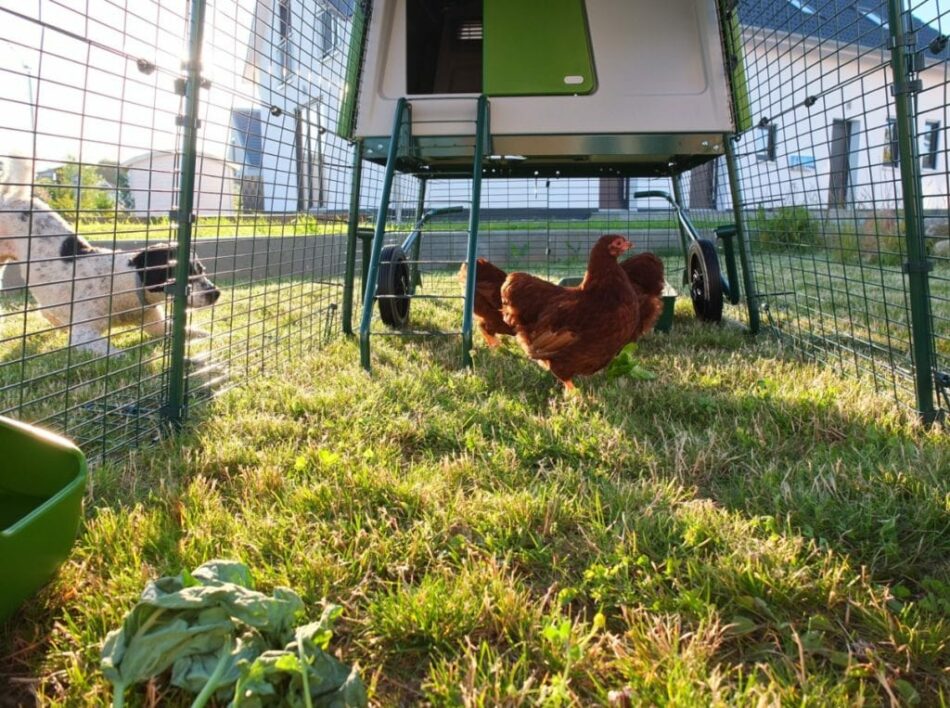
You can keep chickens with other pets when the proper preparations and precautions are in place. Some pets like cats and dogs may have an innate prey drive that chickens can trigger, so it’s important to take introductions slowly to ensure success. With these tips, you’ll be able to confidently introduce your current pets to your chickens, or introduce new pets to your existing flock with confidence.
Keeping chickens with dogs
Dogs are the most common pets in the world, with millions kept as pets across the country. So, if you’re among the many dog owners, adding chickens to your family is possible once you consider your dog’s temperament and trainability.
Assessing your dog
If you’re a dog owner, the first thing to consider is their temperament. Different dog breeds may also react differently to birds as part of their nature. For example, breeds like Labrador Retrievers or German Shorthair Pointers may become easily excited around birds due to their natural hunting and retrieving drives. Other breeds that may have increased prey drives include:
Regardless of their breed, if your dog becomes excited or overly curious around small animals, their behavior will likely carry over to chickens. If your dog loses their mind over the birds at your backyard feeder, or drags you to investigate the park ducks on your evening walks, they’ll likely stress out your flock – and themselves.
Dogs without a prey drive or with little interest in birds will likely not pose a problem to your chickens, but all dogs react differently when new pets enter their territory. Usually, most dogs will adjust to the new backyard occupants just fine after an acclimation period. You will likely see your dog expressing interest in your chickens at first – hanging around and sniffing the coop. They may even express a desire to interact with your chickens through playful postures and behaviors. Understanding your dog’s body language around your chickens will help you determine what their relationship will be like.
Chickens are prey animals, and can be hurt easily. Dogs cannot play with chickens as they would with other dogs or even other pets. It’s important to teach your pup that chickens are fragile friends – not toys or something to hunt.
Teaching dogs to get along with chickens
Unless leashed walks make your dog overly excited, their first encounter with your chickens should be done with a dog collar and lead. Make sure their collar is tight enough that they don’t slip out, but not so tight that it’s uncomfortable. Walk your dog up to your chickens’ enclosure and let them sniff. Maintain a tight leash until you see your dog’s reaction, and allow the lead more slack slowly to reinforce good behavior.
Let your dog watch you spend time with your chickens. This should be done with your chickens in the safety of a strong walk in chicken run. If your dog does more than sniff or hang around the run, take a step back and approach their interaction from a different angle.
It could take several weeks for your dog to fully accept your chickens. Some other ways to help your dogs adjust to your chickens include:
- Setting up chicken fencing around the outside of your flock’s run for your dog to observe them at a distance.
- If your dog has a run or playpen, place it next to your chickens’ run and slowly decrease the distance over several days until they are side-by-side.
- Reward your dog with their favorite treats each time they are calm around your chickens.
Make sure to never leave your dog unattended with your chickens – especially in the beginning. Even if they can’t get into the run with them, an excited dog’s barking can easily stress your flock out.
Keeping chickens with cats
Cats are more difficult to train than their canine counterparts, and are decidedly less predictable in their behavior. But the good news is that most cats don’t see a large hen as potential prey the same way a dog might. Most cat owners will agree that their cats show little to no interest in their chickens. In fact, cats and chickens have a somewhat symbiotic relationship.
Birds and their feed attract rodents, which a cat would much prefer over your hens. So, when your cat is able to patrol your chickens’ surroundings, chances are good that any potential rodent problem will be nipped in the bud.
Some cats may show increased interest in your hens. This largely depends on your cat’s breed and temperament. Cats will pose a greater threat to chicks rather than grown hens, but by keeping your flock in a strong chicken coop and run, you’ll ensure they stay safe from your cat.
Keeping chickens with guinea pigs
It may be tempting to keep some cute cavies in with your chickens, but in reality it’s not wise. Chickens will likely pick on them, and with their short legs, guinea pigs can’t get away from them quickly. Their dietary requirements are also very different, and your chickens may eat your guinea pigs’ food in favor of their own, which means neither animal will be getting the nutrients they need. If you have cavies and want to house them near your chickens, it’s best for them to have their own guinea pig hutch and run.
Keeping chickens with rabbits
Rabbits on the other hand are fast enough to fend for themselves against chickens, and if raised together from a young age, can do well around chickens. Still, they require their own dietary needs and clean sleeping quarters. They don’t roost like chickens, so they’ll need their own burrowing space in the run or under the coop.
The easiest way to achieve this is by adding walk in chicken run partitions. This will allow you to create “rooms” for each species to ensure they all get what they need. You can open the partition doors to allow everyone to be together whenever you’d like, or create a third space as a common area.
Remember to try to give each species as much space as possible in their respective areas to make them feel safe and comfortable.
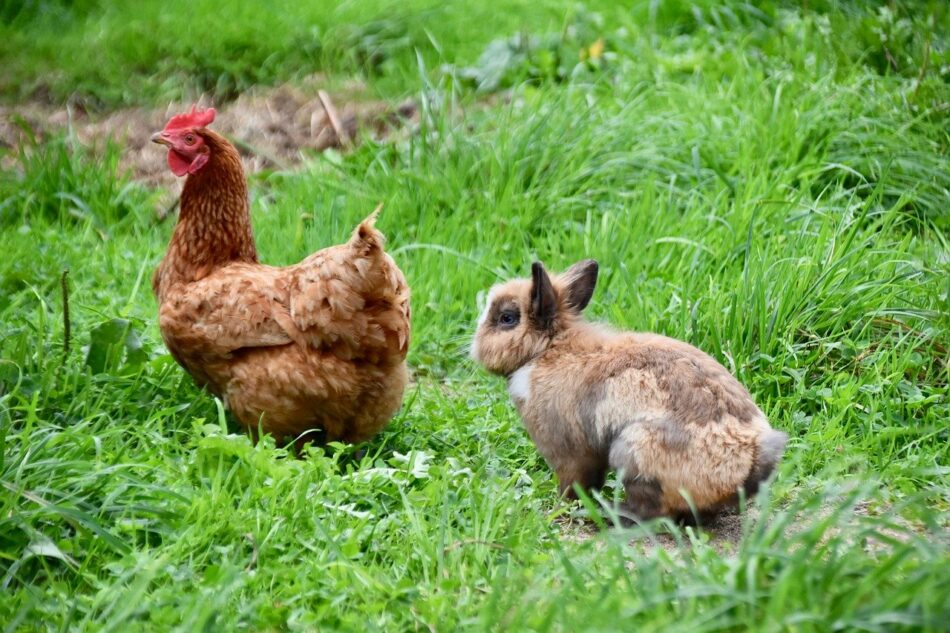
Chickens and other pets
Chickens can also mix happily with goats, and with female ducks (males will tends to bully them). Ironically, they do not mix with birds in an aviary. They will eat anything that falls to the aviary floor, but they will also happily peck the other birds whenever they can and may attract rats and mice, which will cause problems for the smaller birds.
If you live in a rural setting, you can keep chickens with other barnyard animals. Chickens mix happily with:
- Goats
- Sheep
- Cows
- Alpacas or llamas
- Pigs
- Female ducks, guinea fowl, peacocks, geese, or pheasants
Any other avian species kept with chickens should be docile and preferably female, as males can bully hens. Smaller birds like quail or pigeons will likely get pecked at by chickens, so it’s best to stick with larger birds as run-mates. Small pets like hamsters, gerbils, turtles, or frogs should never be kept with chickens – they will be pecked at and killed.
Omlet and your pets
Omlet has all of the pet products you need to keep your furry and feathered family members healthy and happy. Having multiple types of pets is exciting, and through our line of chicken coops, chicken runs, and walk in run partitions, you’ll be able to create a safe haven for all of your animals to enjoy. And, by knowing that Omlet products are protecting your flock, you can rest easy knowing that you’ve provided them with the best chicken housing solutions available.
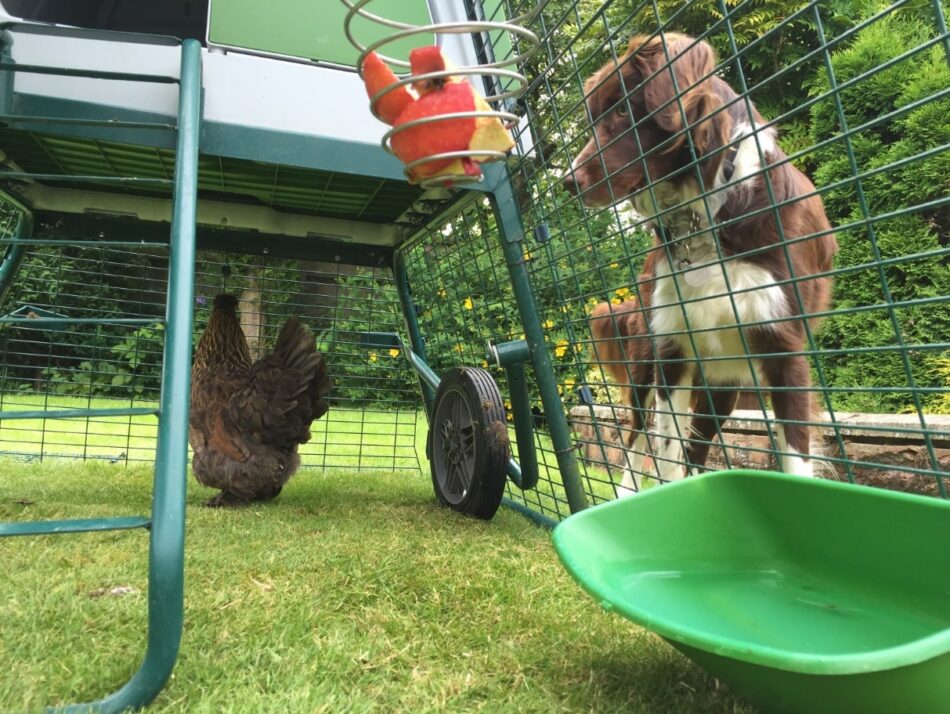

This entry was posted in Budgies




 If you were to meet a species of animal for the first time and had to make an accurate guess about its diet, you would get lots of clues by looking at its teeth. The teeth of a dog, like the teeth of a bear, proclaim loud and clear that this animal is an omnivore – that is, one that eats both meat and vegetables. If you think of your dog as a domesticated wolf, you get a good idea of its natural diet.
If you were to meet a species of animal for the first time and had to make an accurate guess about its diet, you would get lots of clues by looking at its teeth. The teeth of a dog, like the teeth of a bear, proclaim loud and clear that this animal is an omnivore – that is, one that eats both meat and vegetables. If you think of your dog as a domesticated wolf, you get a good idea of its natural diet.
 1. Rabbits
1. Rabbits


